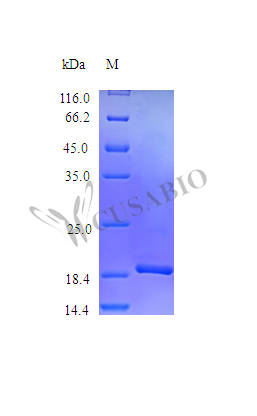Recombinant Mouse Granulocyte colony-stimulating factor protein (Csf3) is expressed in E. coli and contains the full length of the mature protein spanning amino acids 31 to 208. This product comes without tags and achieves a purity level greater than 98%, as confirmed through SDS-PAGE analysis. The protein shows full biological activity, with an ED50 of less than 0.05 ng/ml in cell proliferation assays. Endotoxin levels are kept strictly below 1.0 EU/µg, which helps ensure high-quality research applications.
Granulocyte colony-stimulating factor (Csf3) appears to be crucial for regulating granulocyte production and function. It likely plays a significant role in hematopoiesis by stimulating the proliferation and differentiation of precursor cells into mature granulocytes. Csf3 seems integral to immune response modulation and is widely studied in contexts such as bone marrow recovery and inflammatory processes. This makes it an essential protein in research focused on immunology and hematological studies.
Potential Applications
Note: The applications listed below are based on what we know about this protein's biological functions, published research, and experience from experts in the field. However, we haven't fully tested all of these applications ourselves yet. We'd recommend running some preliminary tests first to make sure they work for your specific research goals.
1. Cell Proliferation and Viability Assays for Hematopoietic Research
This recombinant mouse Csf3 protein is confirmed to be highly biologically active (ED₅₀ < 0.05 ng/ml in murine NFS-60 cells) and suitable for stimulating granulocyte precursor cell proliferation. The exceptional potency and high purity (>98%) ensure reliable dose-response studies in hematopoietic cell cultures. However, researchers should note that while activity was demonstrated in NFS-60 cells (likely a typo for NFS-60), validation in primary bone marrow cells or other granulocyte precursors is recommended to confirm physiological relevance. The low endotoxin levels minimize non-specific stimulation in sensitive cell cultures.
2. Cytokine Signaling Pathway Studies
The biologically active Csf3 is appropriate for investigating cytokine receptor binding and downstream signaling cascades. The tag-free design ensures authentic G-CSF receptor interactions without interference. However, since the protein is expressed in E. coli and lacks mammalian glycosylation, researchers should validate that signaling kinetics and amplitude match those induced by native Csf3, particularly for JAK-STAT pathway activation in primary cells.
3. Antibody Development and Validation
This high-purity, full-length mature Csf3 (31-208aa) serves as an excellent antigen for antibody development. The confirmed biological activity ensures antibodies will recognize functional epitopes. However, researchers should validate that antibodies generated against this E. coli-expressed protein also recognize glycosylated forms of Csf3 in biological samples, as the lack of post-translational modifications might affect some conformational epitopes.
4. Protein-Protein Interaction Studies
The recombinant Csf3 can be used in interaction studies, but researchers should note that the E. coli expression system lacks mammalian post-translational modifications that might affect some protein interactions. While the high purity and biological activity support physiologically relevant binding studies, critical interactions identified should be validated with mammalian-expressed Csf3 or in native cellular contexts.
5. Comparative Species and Evolutionary Studies
This mouse-specific Csf3 enables valid comparative studies with human or other species' G-CSF proteins. However, direct functional comparisons should account for potential differences in glycosylation patterns and receptor binding affinities between species. The well-characterized activity profile provides a reliable reference, but researchers should conduct parallel assays in the same cell system to eliminate host cell variability.
Final Recommendation & Action Plan
This E. coli-expressed mouse Csf3 is an exceptionally high-quality research tool with demonstrated potent biological activity, making it suitable for all proposed applications. For immediate use, employ it at very low concentrations (starting from picogram range) in proliferation assays using NFS-60 cells or primary bone marrow cultures. The extreme potency requires careful serial dilution to avoid over-stimulation. For signaling studies, the tag-free design ensures authentic receptor engagement, but validate key signaling events against native Csf3 when possible. When developing antibodies, this protein is ideal for immunization, but test resulting antibodies against mammalian-expressed Csf3 for comprehensive epitope recognition. For comparative studies, the high specific activity provides an excellent benchmark, but account for potential species-specific differences in glycosylation and receptor affinity. Always include proper controls and consider that while the E. coli expression produces a non-glycosylated form, the demonstrated exceptional bioactivity confirms proper folding and functionality for most research applications.






